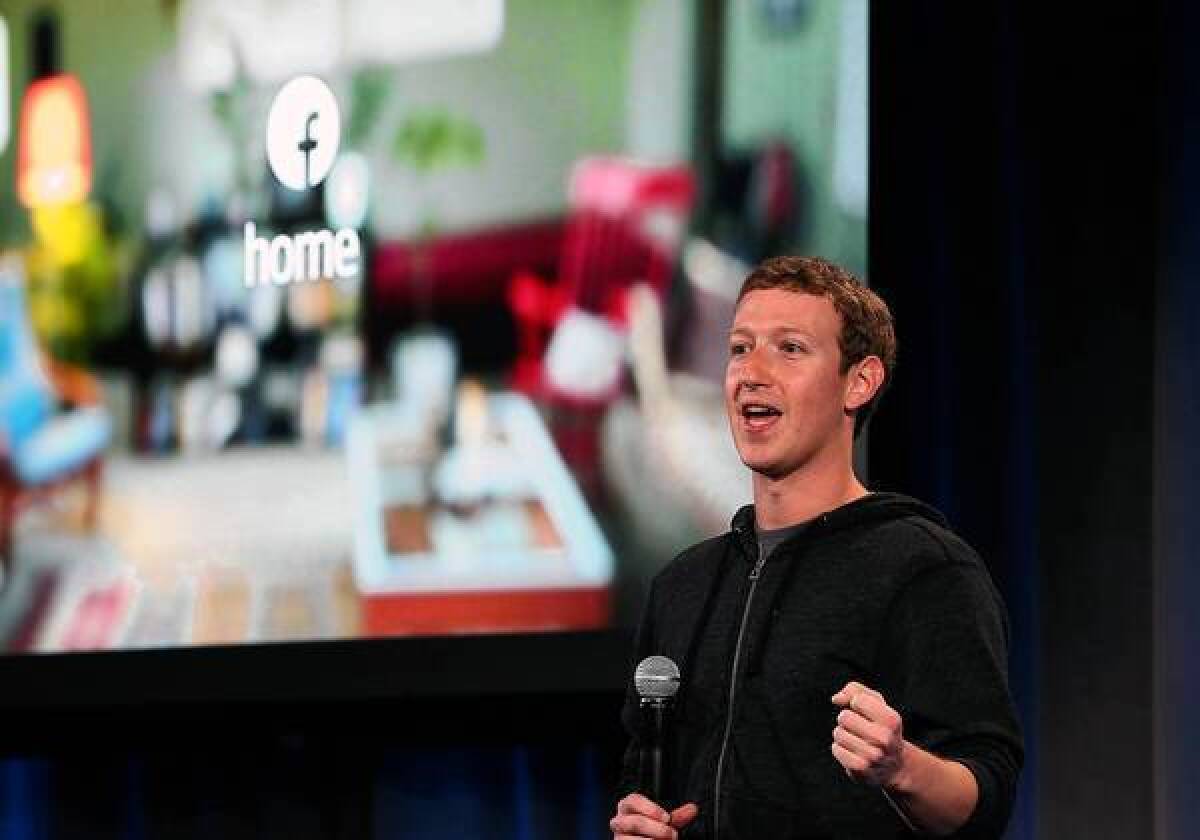Fewer Facebook users take a liking to its new Home software

SAN FRANCISCO — It may be too soon to call Facebook Home a flop.
But it’s clearly not the breakout hit that some expected.
One month after its splashy debut, fewer and fewer people are downloading Facebook’s new mobile software. It took weeks for Facebook Home to hit 1 million downloads — less than 0.1% of its 1.1-billion monthly active user base.
QUIZ: How much do you know about Facebook?
And many who have loaded it onto their smartphones don’t like it. Home has a two-star rating in the Google Play store, with more than half of the 17,000-plus reviews giving Home just one star, the lowest possible rating.
To make matters worse, AT&T; has slashed the price of the HTC First, the Android phone that comes preloaded with the software, to 99 cents with a two-year contract from $99. The fire sale has prompted rumors that AT&T; may stop selling the phone altogether as the HTC First faces rising competition from a slew of new smartphones including another from HTC, the HTC One.
The chief complaint: Facebook Home commandeers the home screen of Android phones to the exclusion of all else including key apps such as email and maps.
Facebook executives have promised fixes this summer, but many users say they plan to stick with the Facebook app they already have on their smartphones until Home is dramatically improved. And some say they don’t see the point in downloading Facebook Home at all.
The rebuke, if it continues, could represent a major setback for the giant social network. Facebook Home is its most ambitious effort yet to catch up to its users who are flocking to mobile devices. Many users never use the service on a desktop computer.
“You are going to have die-hard Facebook users who live their lives in Facebook and want something more immersive. But most of us don’t feel the need to have Facebook take over our phone,” said Jan Dawson, chief telecom analyst at Ovum.
Nathan Watrous, a 22-year-old Web development engineer and avid Facebook user from New York, said he was excited at first to download Facebook Home but soon abandoned it.
“I liked the user interface. It was styled nicely. But it seemed to be a little too intrusive,” Watrous said. He also worried about how much data it would consume.
With Home, Facebook deployed what the mobile industry calls a “launcher,” software that changes the appearance of the phone. Phone manufacturers such as Samsung Electronics and HTC use launchers to customize Android smartphones and put their own services on the home screen.
Facebook Home is Facebook’s version of the Android mobile operating system. It replaces the usual home screen of an Android phone with something called Cover Feed, which scrolls through a parade of photos and updates from Facebook friends.
But many Facebook users who downloaded it didn’t realize it would hijack their home screen and make it difficult to find other apps. Facebook Home reached its zenith in the U.S. one week after its launch, ranking as the 50th most downloaded app. In recent weeks it has plummeted, falling below 300, according to App Annie.
“What it quickly comes down to is: Do you really want Facebook to be your portal to your entire mobile experience?” said Ross Rubin, principal analyst with Reticle Research.
Facebook Chief Executive Mark Zuckerberg is standing by Home, which will be updated monthly.
“This product is still very early, and this is just a first release in a long journey,” Zuckerberg told analysts this month during a call to discuss first-quarter earnings.
Nothing could be more important for Facebook than making the leap with its users to mobile devices and showing them ads there. In recent months, it has made significant progress. Facebook generated $375 million in mobile ad sales in the first quarter, a third of its total advertising revenue.
During a small news briefing at its Menlo Park, Calif., headquarters last week, Facebook executives said they are carefully listening to feedback from users to make Home a better experience.
Facebook says it intentionally rolled out Facebook Home slowly. It is available on only four devices other than the HTC First. It plans to hold off on rolling out the software to more Android phones until it makes apps easier to access with app folders as well as a dock at the bottom of the home screen for key apps such as email and maps.
Facebook’s director of mobile engineering, Cory Ondrejka, would not say how many of the 1 million who have downloaded Home are actively using it. But, he said, the engagement numbers of those who are using it are impressive, with Home users spending 25% more time on Facebook and interacting with other users 25% more than Facebook users as a whole. Chat usage has seen a 7% bump on Home, and Home users send about 10% more messages, he said.
Dawson says it’s too early to write off Facebook Home.
“I don’t think it has to be seen as a failure or black eye for Facebook,” he said. “There are clearly improvements they can make that will help it do better over time.”
But Wedbush Securities analyst Michael Pachter said he doubts Facebook Home will ever reach a mainstream audience.
“I think that it will gain traction among Android users, but I doubt that it will ever become a mainstream offering,” he said.
ALSO:
Bidding for coffee with Apple’s Tim Cook surpasses $605,000
Google CEO Larry Page opens up about his vocal cord problem
Apple, Microsoft, Google, Samsung asked to help fight cellphone thefts
More to Read
Inside the business of entertainment
The Wide Shot brings you news, analysis and insights on everything from streaming wars to production — and what it all means for the future.
You may occasionally receive promotional content from the Los Angeles Times.










